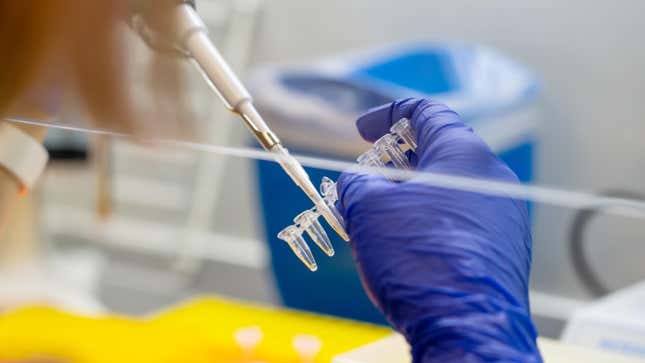
The U.S. will soon greatly expand its vaccination program for monkeypox. On Tuesday evening, the Biden administration announced that it is planning to release a stockpile of over a million vaccine doses to the public by the end of fall. The vaccines will primarily be given to close contacts of confirmed cases and others with a higher risk of exposure, such as gay and bisexual men who have had multiple recent sex partners in areas where the emerging disease has been spotted.
The updated strategy announced by the U.S. Department of Health and Human Services Tuesday will call for a gradual rollout of the country’s supply of the JYNNEOS vaccine. Nearly 300,000 doses will be distributed nationwide in the coming weeks, including 56,000 doses immediately. Another 750,000 doses will be made available during the summer. And up to 500,000 doses should be released later in the year, assuming that they pass the inspection process. All in all, around 1.6 million doses of the two-dose vaccine are expected to be available through the stockpile this year.
The vaccines became available so quickly because the monkeypox virus is closely related to the now-extinct smallpox virus, which was eradicated through a massive global vaccination campaign in 1980. Countries have still maintained a stockpile of smallpox vaccines to this day, however, in part because there’s always the small possibility that the virus could be resurrected as a bioweapon agent. And these vaccines are also thought to be effective against closely related viruses like monkeypox. Indeed, smallpox vaccines do not contain the virus itself, but another related virus called vaccinia.
The U.S. does have a much larger stockpile of the ACAM2000 smallpox vaccine available as well, and the HHS has said that it will release doses to jurisdictions that request it. But the ACAM2000 vaccine comes with more significant side effects than JYNNEOS, making it less suitable for mass distribution, the agency said. In 2019, JYNNEOS became the first vaccine in the U.S. to be approved for both smallpox and monkeypox. It’s estimated to be 85% effective against monkeypox, but that estimate is based on limited real world data. The vaccine can also be given to people soon after a suspected exposure, which should reduce the risk of illness.
In announcing the expanded rollout of its stockpile, the U.S. is following in the footsteps of other countries like the UK. Like these countries, the U.S. will be allocating doses on a priority basis, depending on people’s risk of exposure. At the top will be people known to be in close, prolonged contact with confirmed or suspected cases, followed by those whose sexual partners have been diagnosed with monkeypox, and finally “men who have sex with men who have recently had multiple sex partners in a venue where there was known to be monkeypox or in an area where monkeypox is spreading.” Within these tiers, considerations like a person’s existing health will be taken into account as well.
“Our goal right now is to ensure that the limited supply of JYNNEOS vaccine is deployed to those who can benefit from it most immediately, as we continue to secure additional vaccine doses,” said HHS Assistant Secretary for Preparedness and Response Dawn O’Connell, in a statement.
Monkeypox is thought to primarily infect rodents. Until recently, it had only occasionally spread from animals to humans following its discovery in the 1950s. But there have been more than 4,000 confirmed or suspected cases reported globally in humans this year, including over 300 in the U.S., which is a caseload far above the sporadic outbreaks previously seen in some parts of Africa. Though it may have been circulating in humans at low levels for several years now, its current spread appears to be fueled by close contact during sex. So far, outbreaks have primarily involved men who sleep with men, but the virus can spread to anyone through close contact with someone’s infected rashes and possibly respiratory particles.
Last weekend, the World Health Organization declined to declare a public health emergency of international concern over monkeypox for the time being, though they continued to stress that greater international cooperation and action will be needed to contain the virus before it can permanently become endemic in more parts of the world.